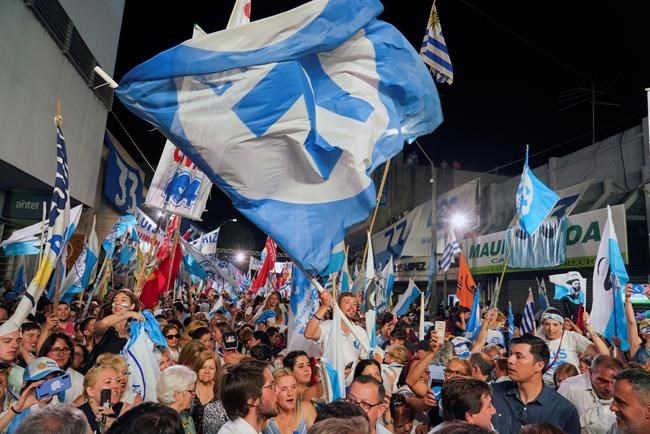
Supporters of Uruguay's presidential candidate for the National Party Luis Lacalle Pou cheer during his closing campaign rally in Las Piedras, Uruguay, Wednesday, Nov. 20, 2019. Uruguay will hold run-off presidential elections on Nov. 24 between presidencial candidate for the National Party, Luis Lacalle Pou and Daniel Martinez, of the ruling party Broad Front. (AP Photo/Matilde Campodonico)
November 21, 2019 - 12:57 PM
MONTEVIDEO, Uruguay - It could have been a tense scene in any other country of South America: With an election nearing, campaigners for Uruguay’s governing left-wing Broad Front faced off in a park with members of the opposing centre-right coalition. Flags and signs waved as a loudspeaker blared the catchy campaign jingle of the Broad Front.
Instead of a fight, the two sides started dancing together — a scene shared widely on social media.
Even a closely fought campaign ahead of Sunday’s election so far hasn’t been enough to drag Uruguay toward the sort of bitter confrontations that have been wracking other nations across the continent — such as the mass protests in Chile and Ecuador, the ouster of a president in Bolivia.
The nation of 3.4 million people has managed to build remarkably resilient institutions since emerging from dictatorship in 1985.
“It’s very likely that the best thing that Uruguay has is its politics: the strength of its institutions, and its parties, its civic culture. Democracy should be our main export,” said political scientist Adolfo Garcé.
Polls indicate that Sunday’s runoff vote could bring an end to 15 years of centre-left rule, with the National Party’s Luis Lacalle Pou, who lost the presidential runoff five years ago, holding a noticeable but single-digit lead over the Broad Front’s Daniel Martínez.
Lacalle Pou, a 46-year-old lawyer and a former senator, comes from political stock. His father is the former President Luis Alberto Lacalle, and his mother was a senator.
He’s fixed his critiques on the last term of current President Tabaré Vázquez. He reminds voters that the unemployment rate has risen to 9.2% and that more than 50,000 jobs have been lost in recent years. He also says that Uruguay is confronting a public safety crisis, in which 2018 saw a record 414 homicides.
Martínez, a 62-year-old engineer who was recently mayor of Montevideo and previously industry minister, has been reminding voters of his party’s longer record, dating back to 2005. He says that when the Broad Front first came to power, 1 million people were living in poverty, almost one third of the population. That number has plummeted, to 8.1%. He highlights how salaries have increased by 60% in real terms.
Martínez, a member of the Socialist Party, represents the more moderate and centre-left wing of the Broad Front, which is a coalition of social democrats, communists, Christian democrats and former guerrilla members.
Martínez earned the most votes in the first round in October, topping Lacalle Pou 39% to 29%.
But in the days that followed, Lacalle Pou formed an alliance with the Colorado Party, which earned 12% in the first round, with Open Cabildo that scored 11% and with the People’s Party and the Independent Party, each of which earned 1%.
The Broad Front, on the other hand, did not secure the support of any additional party.
The Oct. 27 election also renewed Uruguay’s parliament, filling the spots of 30 senators and 99 deputies. The Broad Front lost the majority that it has counted on in the last 15 years to the new alliance Lacalle Pou has assembled.
Despite everything that was at stake, José Arocena, president of the electoral court, told the Associated Press that no significant issues arose during the counting of votes — a contrast to the distrust and violence that broke out over vote counting in Bolivia.
“For the official vote scrutiny, we had large tables with a dozen court officials from the court, and up to 20 delegates from the parties. And even though there were close races, we didn’t have any problems of significance. As usual.”
Still, Garcé saw worrying signs.
“The tone of the campaign hasn’t the best in these last weeks, especially on the part of Martínez. There are signs of ‘la grieta,’” said the academic, using the term used in Argentina to define that country’s division into two irreconcilable political blocks. “I don’t think the blood will reach the river, but we have to open our eyes because the lessons learned by a society are never definitive.”
Garcé noted that while 61% Uruguyans expressed trust in democracy in a 2018 survey conducted by Latinobarometro, that was the lowest rating for Uruguay since 1995.
Still, nearly all have faith in a clean election.
“What we all know is that come March 1, Tabaré Vázquez will hang over the presidential sash to the person who wins. And in this continent, that is a very strong, very clear, very unified and democratic signal,” Fernando Pereyra, president of the central workers’ union, told the television station Teledoce.
News from © The Associated Press, 2019